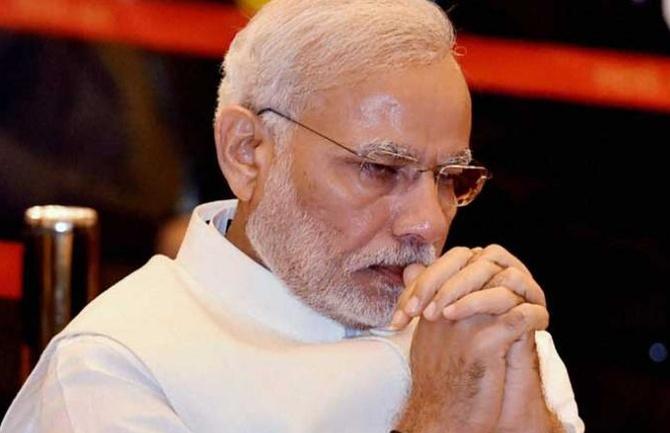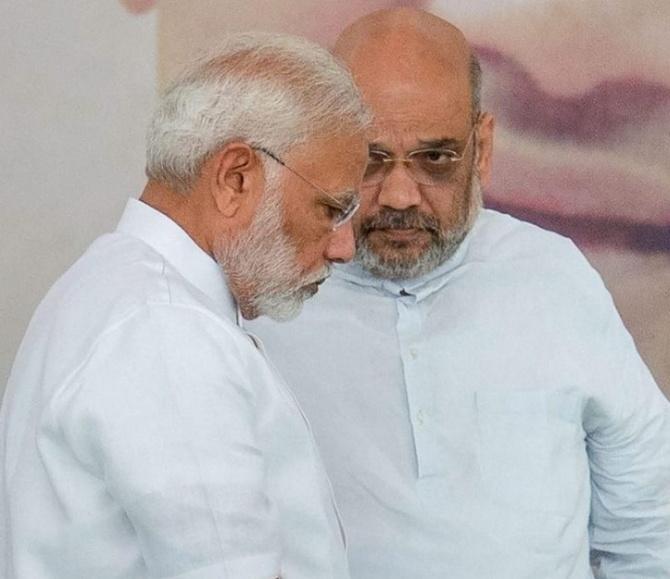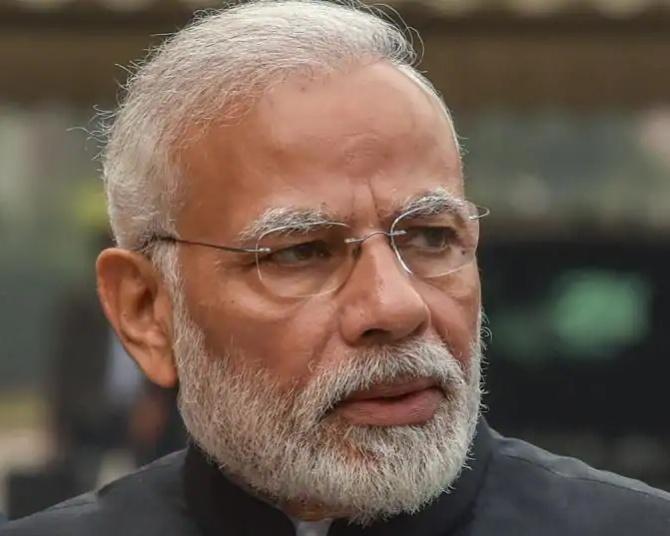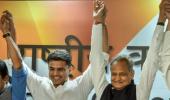The humility with which the BJP deals with these 10 lessons will determine the outcome of 2019, says Shekhar Gupta.

It is conventional wisdom that usually the loser learns from a defeat than the winner in the heady high of victory.
Here are 10, mostly rude lessons for the BJP from this triple setback in the heartland.
1. Its high command style management of the party is now broken. For it to work, Prime Minister Narendra Damodardas Modi has to have the ability to swing state elections by himself.
He did so until Uttar Pradesh. His limitations first became evident in Karnataka where the BJP came up short against an incumbent.
The latest elections have exposed his limitations further.
If you do not have one Supreme Leader capable of making lamp-posts win, you cannot have an all-powerful high command. You must devolve power.
2. The dream of Congress-mukt Bharat was a fantasy so ugly even the RSS had disowned it. It is now over.
The Congress was reduced to 44 in the 2014 Lok Sabha elections. But even in that rout, it had secured 107 million votes against the BJP's 170 million.
You cannot kill a party which still had 107 million adults voting for it in its worst rout in history.
In the past year, the BJP has ended up with a Congress-yukt Gujarat and now a Congress-led Hindi heartland. The BJP cannot wish the Congress away.
3. The BJP's opponents, and more importantly even its allies, are getting over their fear of the 'agencies'.
First, the BJP has misused these too much and too crudely. The Congress too misused these in the past, but they had acquired the sophistication to be less in-your-eye.
Most cases have been so bad that they've fallen by the wayside. The agencies punish their victims through leaks and plants.
Nobody is afraid of bad publicity anymore, because people by and large do not believe it. The Christian Michels can no longer give you an electoral advantage.

4. The era of squashing institutions is over. These results have come on top of the messy revolts in the Supreme Court, the CBI and the RBI.
These have greatly dented the Modi government's and the BJP's image as a hard' establishment that no one would dare mess with.No longer.
The institutions have been losing their fear. These results will help wipe out any residue that survived.
5. The fantasy of controlling both houses of Parliament by 2022, and thereby being able to make important changes to the Constitution and the system of governance, is now buried.
In fact, given how wisely the founders have built the bicameral system for preventing majoritarian excess, it can be safely said now that no party can even in theory own both Houses, whatever the result in 2019.
So, everyone, including the mighty BJP under Modi and Shah has to learn to negotiate, trade spaces.
6. Indian voters aren't about to start voting against Motilal and Jawaharlal Nehru or Indira and Rajiv in 2018-2019.
They are voting for or against you, not someone's great grand-parents. So step out of the time machine.
The war of 2019 will be fought in 'these', not 'those' times.

7. The BJP's slogan is mera desh badal raha hai (my country is changing). It is probably true.
But one thing that is not changing with the voter is her dislike of arrogance, inaccessibility, of leaders who talk down to them. Nor does she like abusive campaigning.
It was a blunder to switch to a vidhwa-Ali-Bajrangbali type of campaign metaphor when what had won you a splendid victory in 2014 was the positive promise of "vikas" and "achche din".
8. Madhya Pradesh, Rajasthan and Chhattisgarh are India's most "Hindu" states among those where the BJP is in a straight fight with the Congress.
What that means is, the Muslim vote in these is way less than even half the national average.
You might, therefore, be able to occasionally polarise a state like Uttar Pradesh with a large Muslim population, but people in predominantly Hindu ones won't vote against the Muslims of UP, Kerala, Kashmir, Assam or Pakistan. Their concern is their own fate.
9. In 2014 you had been able to use nationalism and economic optimism to reunite the Hindu vote chronically divided by caste.
The half-life of that formulation ended some time back. Now, win allies among some crucial caste-based parties, concede space to them, or retrace your steps back closer to your core vote.
10. And finally, stop treating Rahul Gandhi like a joke. This election is his coming of age as a political leader. He has put in the effort and commitment.
Your criticism of him and his family is dynastic arrogance and 'foreign-ness'. It worked as long as he looked aloof and kept disappearing while you were seen as true, desi sons of the soil.
The young Indian voter hates a sense of entitlement. By this campaign, however, the roles have reversed. Rahul has looked more humble, accessible, less entitled, and more positive.
How the BJP deals with these 10 lessons will determine the outcome of 2019.
Once again, a loser usually learns more from a loss than the winner from a victory.
To live up to this with some humility, or imperiously defy it, the choice is the BJP's.
By special arrangement with ThePrint












 © 2025 Rediff.com -
© 2025 Rediff.com -